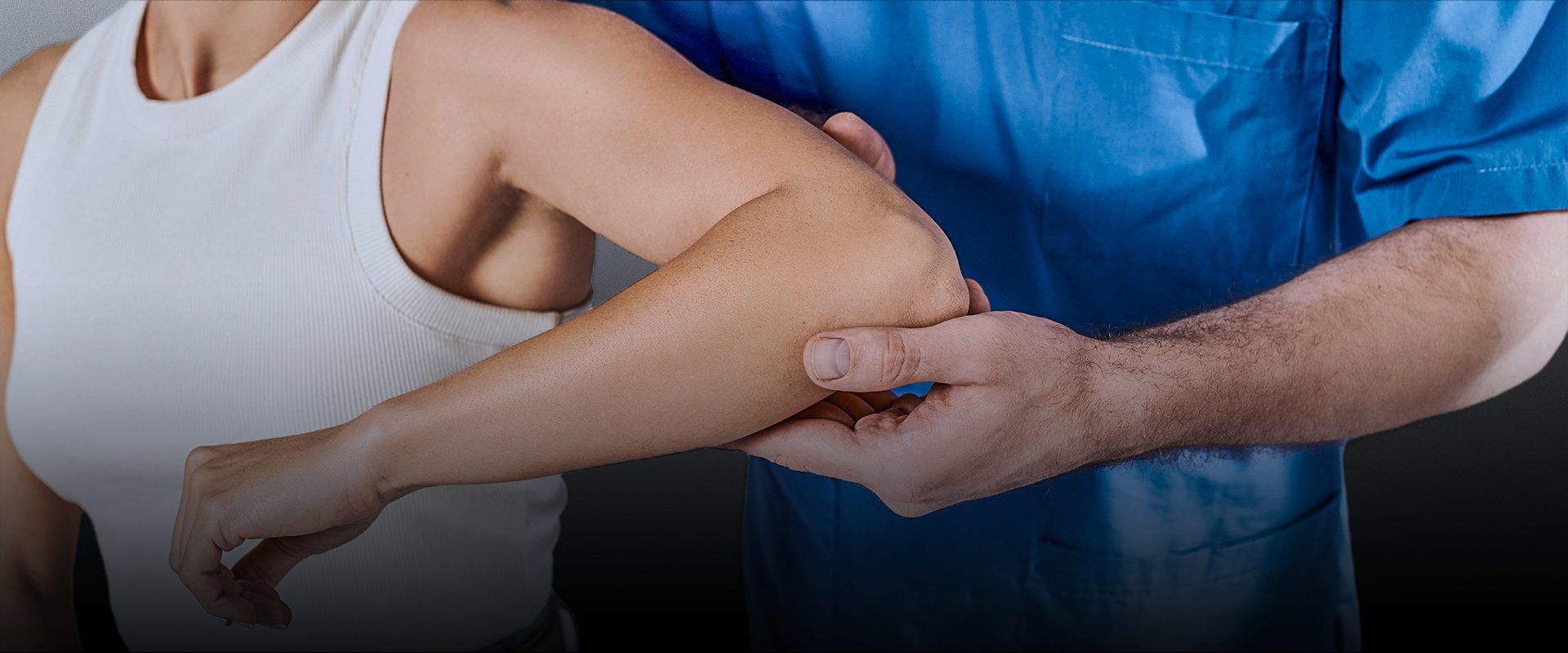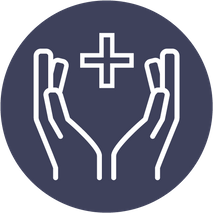
Physical Therapy for pinched nerve in arm
AT EVOLVE
Physical Therapy for pinched nerve in arm
HOW CAN PHYSICAL THERAPY HELP A PINCHED NERVE IN YOUR ARM?
Many people have heard of a pinched nerve in their neck or back, but did you know you can experience the same type of nerve compression in your arm? Conditions like cubital tunnel syndrome, carpal tunnel syndrome and thoracic outlet syndrome all involve compression of one or more nerves in the arm. These conditions can cause weakness, aching, burning, numbness and tingling in the distribution of the affected nerve. Nerve compressions occur when the narrow space through which a nerve passes becomes further confined or the nerve is chronically irritated. This can occur due to trauma, ganglion cyst, friction or mechanical compression, congenital deformities, work or athletic activities.
Physical therapists are movement experts with a deep understanding of the musculoskeletal system. We will examine your arm to identify the pinched nerve and look for contributing factors to your symptoms. We utilize manual therapy techniques, modalities, exercises and other treatments to reduce the symptoms of a pinched nerve and address underlying causes.
WHAT DOES PHYSICAL THERAPY TREATMENT FOR A PINCHED NERVE IN THE ARM LOOK LIKE?
Physical therapy treatments for a pinched nerve in the arm are aimed at reducing symptoms of pain, burning and numbness; improving muscle strength; addressing underlying factors and facilitating a return to full activity. My team of therapists and I will start by getting to know your concerns and goals and performing a thorough physical exam of the arm while identifying factors that may be contributing to the nerve compression. Your therapist will employ manual therapy interventions to target joint and tissue mobility while also prescribing movements and exercises for nerve mobility, muscle strength and motor control to be performed in the home and the clinic.
HOW LONG WILL I NEED PHYSICAL THERAPY?
The duration of your physical therapy plan of care will vary depending on the severity of symptoms, what is causing the compression as well as the types of activities you aim to resume. While full resolution of symptoms can take some time, you may begin to see some results fairly quickly. You should experience some improvements in many symptoms such as pain, stiffness, and inflammation within a couple of weeks though return to pain-free activities will likely take longer. Achieving long-lasting results may take some time, but dedication to your program will not only help you achieve these results but will help to decrease the likelihood of symptoms recurring in the future.
CUBITAL TUNNEL SYNDROME–ULNAR NERVE ENTRAPMENT
Cubital tunnel syndrome or entrapment of the ulnar nerve is the second most common type of nerve compression in the arm. It is caused by compression, irritation or decreased blood flow to the ulnar nerve as it passes through the cubital tunnel, a narrow passageway in the elbow created by bone, muscles and ligaments.
Symptoms can range from mild to severe and can result in significant disability of the hand. Common symptoms of ulnar nerve entrapment include:
- Pain or aching along the inside of the elbow or forearm
- Numbness and tingling in the pinky and ½ the ring finger and the palm or back of the hand beneath those fingers
- A non-painful popping or snapping on the inside of the elbow when you move it
- Difficulty moving the pinky finger outward
- Inability to strongly hold a piece of paper between the index finger and thumb (Froment’s Sign)
- Atrophy of the intrinsic hand muscles and an abnormal claw posture of the 4th and 5th fingers
- Tenderness of the ulnar nerve in the cubital tunnel
CARPAL TUNNEL SYNDROME–MEDIAN NERVE ENTRAPMENT
Carpal Tunnel Syndrome is caused by compression on the median nerve as it passes through the carpal tunnel of the wrist. The carpal tunnel is made up of the bones of the wrist and the muscles and ligaments that lie atop them. Carpal Tunnel Syndrome is the most common nerve compression neuropathy.
Common symptoms of carpal tunnel include:
- Pain and paresthesias (tingling or abnormal sensations) along the median nerve sensory distribution in the hand
- Pain that radiates up into the arm and sometimes the shoulder or neck
- Night pain
- Hand weakness
- Decreased grip strength
- Decreased finger coordination
- Thumb muscle atrophy
- Wrist stiffness
THORACIC OUTLET SYNDROME (TOS)
The thoracic outlet is a narrow passageway between the collarbone and the first rib in the chest through which the nerves and blood vessels that supply the arm pass. When the nerves are compressed, symptoms of a pinched or entrapped nerve can arise. If you experience these symptoms, a diagnosis of TOS should be explored:- Aching, burning, or sharp pain anywhere between the face, neck, occipital region, chest, arm or hand
- Paresthesias, tingling or abnormal sensation in the arm or hand
- Weakness or fatigue in the arm and hand
- The feeling of heaviness in the arm
- Blotchy or discolored skin or changes in temperature
- Symptoms that are often worse when the arm is held overhead with the hand behind the head such as when scratching the back of your head or washing your hair
End Injury Progression
Physical therapy for a pinched nerve in arm has proven to prevent injury, slow and even stop pain issues, improve performance, and reverse injury progression in many cases.
Relieve Pain
The movements used in this technique can target your entire body helping you to manage discomfort and pain during the course of your physical therapy treatments.
Improve Range of Motion
Posture awareness is an important area to focus on due to the fact that certain positions may cause you further discomfort and pain.
Restore Mobility
You can regain mobility and flexibility by taking part in the stretches and exercises as prescribed by your physical therapist.
How Long Will Physical Therapy for A Pinched Nerve in Arm Last?
If you decide to work with a physical therapist to help correct your pinched nerve in arm issues, your entire treatment plan could consist of around 8-20+ different physical therapy sessions that will each last 60-90 minutes. Once you complete your customized physical therapy treatment plan, you will be able to continue to do the prescribed stretches and exercises utilized during your PT sessions yet in the comfort of your own home.
WHAT PHYSICAL THERAPY TREATMENTS ARE BEST FOR NERVE COMPRESSION IN THE ARM?
After identifying a nerve compression in your arm, the goal is to reduce irritation or compression in the affected nerve which can relieve your symptoms. Conservative treatments such as physical therapy and sometimes anti-inflammatories or corticosteroid injections are often recommended by doctors first and can be very successful. In the case where conservative treatment does not fully address the nerve compression, surgery may be recommended by your doctor to relieve the remaining compression on the nerve.
While physical therapy for carpal tunnel or cubital tunnel syndrome and TOS will always be individualized to your specific needs, below are some common goals and treatments of physical therapy to manage nerve compression in the arm:
TREATMENT TO REDUCE INFLAMMATION: Modalities like ice, ultrasound, contrast baths or iontophoresis may be used to reduce inflammation in the earliest stages
NERVE AND TISSUE MOBILITY EXERCISES: Nerve mobilization and soft tissue mobilization techniques are often used to ensure good tissue health and proper nerve mobility
BIOMECHANICS AND MOVEMENT TRAINING: In cases where mechanical compression or irritation of a nerve occurs due to faulty or non-optimal movement patterns, your physical therapist can teach you to move more optimally, and sometimes use supports like taping or bracing, to help lessen the stress on your nerves.
STRETCHING: Muscle stretching is often prescribed to improve muscle length if this is a factor contributing to your symptoms
STRENGTHENING: Strengthening of muscles affected by the pinched nerve or contributing to the pinched nerve are often prescribed in the mid and late stages of healing
While nerve compression in the arm can significantly impact your function and quality of life, physical therapy is a first-line treatment to reduce compression and alleviate symptoms. If you are experiencing pain, weakness or paresthesias in the arm or hand, call Evolve Physical Therapy today to schedule an initial evaluation.
Mill Basin (located in Harbor Fitness)
6161 Strickland Ave
Brooklyn, NY 11234
Monday: 7am-8pm
Tuesday: 7am-8pm
Wednesday: 8am-5pm
Thursday: 7am-8pm
Friday: 8am-1pm
718.306.6846
Park Slope (located in Harbor Fitness)
550 5th Ave.
Brooklyn, NY 11215
Monday: 9am-8pm
Tuesday: 8am-6pm
Wednesday: 9am-8pm
Thursday: 8am-6pm
Friday: 8am-3pm
718.306.6846
Gravesend
372 Avenue U
Brooklyn, NY 11223
Monday-Thursday: 8am-8pm
Friday: 8am-3pm
Kings Highway
945 Kings Highway
Brooklyn, NY 11223
Monday-Wed.: 12pm-8pm
Ready to take the next step to a healthier you?
Contact Us Today!
PHYSICAL THERAPY FOR PINCHED NERVE IN ARM
Need physical therapy for a pinched nerve in your arm?
Let our caring and compassionate physical therapists help you with relieving pain while getting you back on your feet comfortably.
Call now to schedule your first PT consultation free of charge.
Call: 1-718-306-6846







